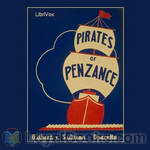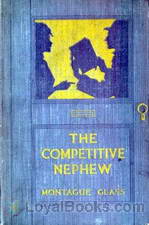|
Books Should Be Free Loyal Books Free Public Domain Audiobooks & eBook Downloads |
|
|
Books Should Be Free Loyal Books Free Public Domain Audiobooks & eBook Downloads |
|
Humorous Books |
|---|
|
Book type:
Sort by:
View by:
|
By: Sewell Ford (1868-1946) | |
|---|---|
 Torchy, Private Sec.
Torchy, Private Sec.
| |
By: Ellis Parker Butler (1869-1937) | |
|---|---|
 Pigs is Pigs
Pigs is Pigs
| |
 Cheerful Smugglers
Cheerful Smugglers
Saving for the baby's education: how can a young family be disciplined so as to regularly put money in the pig (bank)? Why, put a tariff on all items coming into the house, just like the U.S. Government does/did for items coming into the country! But the devil is in the details; what about taxing items brought in by visitors? Is the housemaid herself a taxable item? What items really are 'necessaries' versus luxuries? When visitors arrive these guests stoop to either 'smuggling' in their luggage items to avoid having to pay up to 30% of the value, or wear only what they came dressed in... | |
 Goat-Feathers
Goat-Feathers
| |
By: John C. Hutcheson | |
|---|---|
 Tom Finch's Monkey and How he Dined with the Admiral
Tom Finch's Monkey and How he Dined with the Admiral
| |
By: E. W. (Edward William) Cole (1832-1918) | |
|---|---|
 Cole's Funny Picture Book No. 1
Cole's Funny Picture Book No. 1
| |
By: Ada Leverson (1862-1933) | |
|---|---|
 Love's Shadow
Love's Shadow
The first in a trilogy of books known together as 'The Little Ottleys', this is a sparkling social comedy set in Edwardian London. Ada Leverson was a great friend and staunch supporter of Oscar Wilde and shared his love for sharp, witty writing. Like Wilde, her work is characterised by a wonderful ear for dialogue and deft characterization. 'Love's Shadow' introduces us to Bruce and Edith Ottley and their friends, who are to all appearances living the bright and carefree lives of the well-to-do. But there are cracks appearing in the facade... | |
 Tenterhooks
Tenterhooks
The second of the 'Little Ottleys' trilogy, an Edwardian comedy of manners. Several years have passed since the events in 'Love's Shadow', but Bruce Ottley is as difficult and irksome as ever. His beautiful wife Edith continues to gently manage his foibles, and regards him with a fond tolerance. But then she meets the enchanting - and very handsome - Aylmer Ross. The attraction between them is undeniable, and Edith's quiet serenity is shattered. Could this spell the end for the Ottley's marriage?... | |
By: Robert Henry Newell (1836-1901) | |
|---|---|
 The Orpheus C. Kerr Papers
The Orpheus C. Kerr Papers
These are a collection of humorous "letters" written by a fictional character to a relation in the north during the Civil War. They were published regularly in the New York Mercury Sunday newspaper for the four years of the war. In the letters, Newell pokes fun at northern generals, politicians, and has hard things to say about southerners. Although Newell is rarely serious, I imagine the letters reflect the bitterness and frustration of many northerners at the time. (Introduction by Margaret) | |
By: Edward Eggleston (1837-1902) | |
|---|---|
 Hoosier Schoolmaster
Hoosier Schoolmaster
"Want to be a school-master, do you? You? Well, what would you do in Flat Crick deestrick, I'd like to know? Why, the boys have driv off the last two, and licked the one afore them like blazes. You might teach a summer school, when nothin' but children come. But I 'low it takes a right smart man to be school-master in Flat Crick in the winter. They'd pitch you out of doors, sonny, neck and heels, afore Christmas." | |
By: Joseph Crosby Lincoln (1870-1944) | |
|---|---|
 Cape Cod Stories
Cape Cod Stories
This book (eleven short stories) was also published under the title of “The Old Home House”. Joseph Crosby Lincoln (1870 – 1944) was an American author of novels, poems, and short stories, many set in a fictionalized Cape Cod. Lincoln's work frequently appeared in popular magazines such as the Saturday Evening Post and The Delineator.... Lincoln claimed that he was satisfied "spinning yarns" that made readers feel good about themselves and their neighbors. Two of his stories have been adapted to film... | |
 The Woman-Haters: a yarn of Eastboro twin-lights
The Woman-Haters: a yarn of Eastboro twin-lights
| |
By: Marietta Holley (1836-1926) | |
|---|---|
 Samantha Among the Brethren
Samantha Among the Brethren
| |
By: Robert Copland (fl. 1515) | |
|---|---|
 Jyl of Breyntfords Testament
Jyl of Breyntfords Testament
Introduction - This is a collection of ten comic pieces from the 16th century and earlier, as compiled and edited by Frederick Furnivall for private circulation in 1871. Only the first is by Copland. (Introduction by Grant Hurlock) | |
By: William S. Gilbert (1836-1911) | |
|---|---|
 The Pirates of Penzance
The Pirates of Penzance
The Pirates of Penzance; or, The Slave of Duty is a comic opera in two acts, with music by Arthur Sullivan and libretto by W. S. Gilbert. The story concerns Frederic, who, having completed his 21st year, is released from his apprenticeship to a band of tender-hearted pirates. He meets Mabel, the daughter of Major-General Stanley, and the two young people fall instantly in love. Frederic finds out, however, that he was born on 29 February, and so, technically, he only has a birthday each leap year... | |
By: Bruce Bairnsfather (1888?-1959) | |
|---|---|
 Fragments From France
Fragments From France
| |
By: Thomas A. Janvier (1849-1913) | |
|---|---|
 Uncle Of An Angel
Uncle Of An Angel
In what I have read so far this book appears to be a humorous character study on two levels. That between the uncle and niece and that of polite society in the 19th century. Anything can happen. I for one want to find out what will happen!! | |
By: George A. Birmingham (1865-1950) | |
|---|---|
 The Simpkins Plot
The Simpkins Plot
| |
By: Norman Lindsay (1879-1969) | |
|---|---|
 The Magic Pudding
The Magic Pudding
Bunyip Bluegum the koala sets out on his travels taking only a walking stick. At about lunchtime, feeling more than slightly peckish, he meets Bill Barnacle the sailor and Sam Sawnoff the penguin who are eating a pudding. The pudding is a magic one which, no matter how much you eat it, always reforms into a whole pudding again. He is called Albert, has thin arms and legs and is a bad-tempered, ill-mannered so-and-so into the bargain. His only pleasure is being eaten. The book is divided into four "slices" instead of chapters. (Introduction by Wikipedia) | |
 The Magic Pudding Being the Adventures of Bunyip Bluegum and His Friends Bill Barnacle & Sam Sawnoff
The Magic Pudding Being the Adventures of Bunyip Bluegum and His Friends Bill Barnacle & Sam Sawnoff
| |
By: Various | |
|---|---|
 Little Masterpieces of American Wit and Humor Vol 1
Little Masterpieces of American Wit and Humor Vol 1
Volume 1 of a ten volume collection of amusing tales, observations and anecdotes by America's greatest wordsmiths. This work includes selections by such household favorites as Mark Twain, Oliver Wendell Holmes, Benjamin Franklin and Washington Irving. | |
By: Thomas L. Masson (1866-1934) | |
|---|---|
 Masterpieces of American Wit and Humor
Masterpieces of American Wit and Humor
| |
By: Dorothy Scarborough (1878-1935) | |
|---|---|
 Humorous Ghost Stories
Humorous Ghost Stories
Includes: An introduction by Dorothy Scarborough -- The Canterville ghost / by Oscar Wilde -- The ghost-extinguisher / by Gelett Burgess -- "Dey ain't no ghosts" / by Ellis Parker Butler -- The transferred ghost / by Frank R. Stockton -- The mummy's foot / Théophile Gautier -- The rival ghosts / Brander Matthews -- The water ghost of Harrowby Hall / by John Kendrick Bangs -- Back from that bourne / Anonymous -- The ghost-ship / by Richard Middleton -- The transplanted ghost / by Wallace Irwin --... | |
By: Finley Peter Dunne (1867-1936) | |
|---|---|
 Mr. Dooley: In the Hearts of His Countrymen
Mr. Dooley: In the Hearts of His Countrymen
| |
 Mr. Dooley's Philosophy
Mr. Dooley's Philosophy
| |
 Mr. Dooley Says
Mr. Dooley Says
| |
By: Anne Warner (1869-1913) | |
|---|---|
 The Rejuvenation of Aunt Mary
The Rejuvenation of Aunt Mary
| |
 Susan Clegg and Her Friend Mrs. Lathrop
Susan Clegg and Her Friend Mrs. Lathrop
| |
 Susan Clegg and Her Neighbors' Affairs
Susan Clegg and Her Neighbors' Affairs
| |
 Susan Clegg and a Man in the House
Susan Clegg and a Man in the House
| |
By: Montague Glass (1877-1934) | |
|---|---|
 The Competitive Nephew
The Competitive Nephew
| |
By: Martin Ross (1862-1915) | |
|---|---|
 Some Experiences of an Irish R.M.
Some Experiences of an Irish R.M.
| |
By: Roger Kuykendall | |
|---|---|
 We Didn't Do Anything Wrong, Hardly
We Didn't Do Anything Wrong, Hardly
| |
By: John Galt (1779-1839) | |
|---|---|
 The Provost
The Provost
| |
By: Percy Hetherington Fitzgerald (1834-1925) | |
|---|---|
 Bardell v. Pickwick
Bardell v. Pickwick
| |
By: Artemus Ward (1834-1867) | |
|---|---|
 The Complete Works of Artemus Ward — Part 1: Essays, Sketches, and Letters
The Complete Works of Artemus Ward — Part 1: Essays, Sketches, and Letters
| |
By: William H. Mallock (1849-1923) | |
|---|---|
 Every Man His Own Poet Or, The Inspired Singer's Recipe Book
Every Man His Own Poet Or, The Inspired Singer's Recipe Book
| |
By: Percival Leigh (1813-1889) | |
|---|---|
 The Comic Latin Grammar A new and facetious introduction to the Latin tongue
The Comic Latin Grammar A new and facetious introduction to the Latin tongue
| |
By: T. W. H. Crosland (1865-1924) | |
|---|---|
 The Old Man's Bag
The Old Man's Bag
| |
By: Thomas Chandler Haliburton (1796-1865) | |
|---|---|
 The Attaché; or, Sam Slick in England
The Attaché; or, Sam Slick in England
| |
By: Barry Pain (1824-1928) | |
|---|---|
 If Winter Don't
If Winter Don't
Barry Pain's parody takes a sharp knife to ASM Hutchinson's best selling novel 'If Winter Comes'.We follow the professional and marital decline of long suffering (and loving it), Luke Sharper, as his marriage to Mabel flounders while his love for Jona flourishes. It could only end in tears.....Or could it? ( | |
By: Charles Harrison (-1943) | |
|---|---|
 A Humorous History of England
A Humorous History of England
| |
By: Henry Austin Dobson (1840-1921) | |
|---|---|
 "You Bid Me Try"
"You Bid Me Try"
Henry Austin Dobson, commonly Austin Dobson, was an English poet and essayist. His official career was uneventful, but as a poet and biographer he was distinguished. Those who study his work are struck by its maturity.It was about 1864 that he turned his attention to writing original prose and verse, and some of his earliest work was his best. It was not until 1868 that the appearance of St Paul’s, a magazine edited by Anthony Trollope, gave Harry Dobson an opportunity and an audience; and during the next six years he contributed some of his favourite poems, including “Tu Quoque,” “A Gentleman of the Old School,” “A Dialogue from Plato,” and “Une Marquise... | |
By: C. E. (Clara Elizabeth) Fanning (1878-1938) | |
|---|---|
 Toaster's Handbook Jokes, Stories, and Quotations
Toaster's Handbook Jokes, Stories, and Quotations
| |
By: Donald Ogden Stewart | |
|---|---|
 Perfect Behavior
Perfect Behavior
A humorous guide to manners and etiquette for ladies and gentlemen in a social "crises," published in 1922. (Introduction by Samanem) | |
By: Don Marquis (1878-1937) | |
|---|---|
 Danny's Own Story
Danny's Own Story
Danny is the proverbial basket-on-the-doorstep baby, found by Hank and Elmira Walters, a childless couple who welcome him into their home because they need a new topic over which to bicker. Bicker they do, and fight just as often, from the day they attempt to settle on a name, to the day eighteen years later, when Danny and Hank come to blows and Danny leaves home in company with Dr. Kirby, bottler and supplier of the miracle elixir, Siwash Indian Sagraw. For years Danny wanders aimlessly--from Illinois to Indiana to Ohio, back to Illinois, then into Tennessee and points south--sometimes in company with Dr... | |
By: P. Hampson | |
|---|---|
 The Romance of Mathematics Being the Original Researches of a Lady Professor of GirthamCollege in Polemical Science
The Romance of Mathematics Being the Original Researches of a Lady Professor of GirthamCollege in Polemical Science
| |
By: W. S. Gilbert (d 1911) | |
|---|---|
 More Bab Ballads
More Bab Ballads
This is a subset of the first twelve poems from the second collection of Gilbert’s “Bab Ballads” – light verses poking fun at the life and people of his time in Gilbert’s unique “topsy-turvey” style. The epitaph on his memorial on the Victoria Embankment in London is “HIS FOE WAS FOLLY AND HIS WEAPON WIT”, an epitaph amply exemplified in these verses. | |
By: W. S. (William Schwenck) Gilbert (1836-1911) | |
|---|---|
 Bab Ballads and Savoy Songs
Bab Ballads and Savoy Songs
| |
By: Al. G. (Alfred Griffith) Field (1852-) | |
|---|---|
 Watch Yourself Go By
Watch Yourself Go By
| |
By: Stephen Lucius Gwynn (1864-1950) | |
|---|---|
 Irish Books and Irish People
Irish Books and Irish People
| |
By: Will Rogers (1879-1935) | |
|---|---|
 Rogers-isms, the Cowboy Philosopher on the Peace Conference
Rogers-isms, the Cowboy Philosopher on the Peace Conference
| |
By: Mark Lemon (1809-1870) | |
|---|---|
 How to Make a Man of Consequence
How to Make a Man of Consequence
Mark Lemon had a natural talent for journalism and the stage, and, at twenty-six, retired from less congenial business to devote himself to the writing of plays. More than sixty of his melodramas, operettas and comedies were produced in London, whilst at the same time he was contributing to a wide variety of magazines and newspapers, and was founding editor of both Punch and The Field. | |